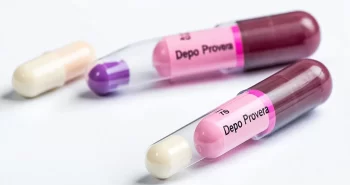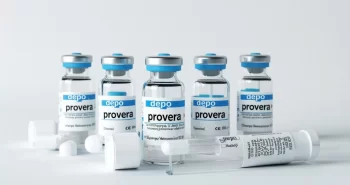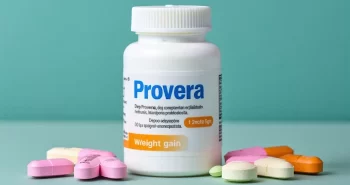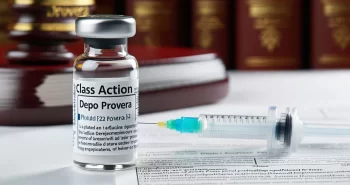Depo‑Provera Use Records and Claim Eligibility
 Fact Checked By Our Attorneys
Fact Checked By Our Attorneys
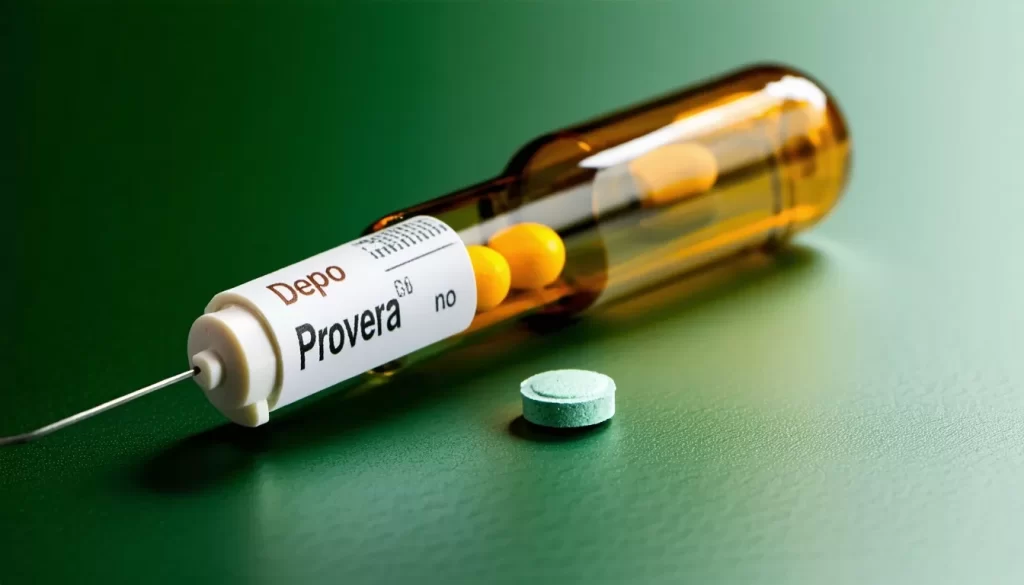
Depo Provera shot injuries have prompted lawsuits against the manufacturer. If you’ve suffered side effects or long-term health issues from the shot, you may qualify for legal compensation. This page explains how to document your case, understand manufacturer liability, and get legal help.
Table of Contents:


Depo Provera Shot: Legal Overview
Thinking about using Depo Provera as your go-to for birth control? Let’s break down what’s what. Depo Provera, AKA the birth control shot, is a form of contraception that you get through an injection every three months. It’s all about that progestin, a hormone that keeps pregnancy at bay.
So, what’s the deal with progestin? Well, it’s got two jobs. First, it blocks ovulation, meaning no egg gets released and waits around in the ovary. Second, it thickens up the cervical mucus to make sperm’s journey a tough one, stopping them from reaching any egg.
When it comes to the “how,” a doctor or nurse usually gives the shot in the muscle — typically in your buttocks or upper arm. But there’s a twist! If you’re feeling like handling it at home, there’s the Depo-subQ Provera 104, a self-inject version for folks wanting more control and comfort.
Now, effectiveness is pretty solid. With usual use, Depo Provera does its job about 96% of the time. Stick closely to the every-three-month plan, and that number bumps up to 99%. Not too shabby, right?
As for the cost, it can hit as high as $150, but sometimes you might get it for free, depending on your insurance cover or special programs. Whether at the clinic or the comfort of your couch, it’s a reliable way to steer clear of pregnancy.
Knowing the ins and outs of Depo Provera ensures you’re making the right choice for your lifestyle. By getting the hang of how it works and its method of giving, you’re set up for effective and smart birth control use.
Depo Provera Shot Claims Timeline
Let’s talk about how long that Depo Provera shot’s gonna keep working its magic. To get the full picture, we gotta first grasp how this little wonder works. Depo-Provera does its job by stopping ovulation dead in its tracks—no egg release means no pregnancy to worry about (Healthline).
For best results, sticking to a strict schedule’s a biggie. Planned Parenthood mentions getting your shot every 12 to 13 weeks—basically four shots a year. You can either do this at home if you’re comfy with it or have a pro in a healthcare setting help you out. Keeping those shots on time makes sure Depo-Provera keeps doing its thing for you.
Here’s how the timing goes for keeping up with Depo-Provera:
| Shot Timing | When to act |
|---|---|
| First Shot | Your starting point |
| Second Shot | In 12-13 weeks from the first one |
| Third Shot | 12-13 weeks post-second shot |
| Fourth Shot | 12-13 weeks after the third one |
Info pulled from Planned Parenthood
To keep things effective and avoid any little surprises, getting those shots within the timeframe is a must. If you’re past 13 weeks since the last one, time to bring in a backup birth control method (Verywell Health).
Being consistent with your Depo-Provera schedule isn’t just a suggestion—it’s key to making sure it works as a contraceptive. Skipping or delaying those shots can bump up the risk of the method not working and an unexpected pregnancy. If you’ve slipped up or are unsure when your next shot’s due, it’s a smart move to chat with your healthcare provider about how to get back on track with your birth control.
Missed Shot Legal Considerations
Let’s talk Depo-Provera – the birth control shot some of us love for its convenience. This little jab has your back as long as you keep up with the 12-week schedule. Miss it? Well, things might get a bit shaky, especially when it comes down to avoiding pregnancy.
Skip that 12-week mark and the shot’s magic might lose its touch. You might find yourself with an increased chance of pregnancy. That’s why staying on top of your injection appointments is a game plan worth sticking to. Every 12 to 13 weeks, make sure you roll up your sleeves for another round to keep things on track.
Missed your shot or got a bit late with it? Don’t panic, but do consider a quick chat with your healthcare provider. They might nudge you towards taking a pregnancy test or suggest emergency contraception if you’ve had any recent intimate times. It’s their way of keeping you on the safe side of things. Remember, if you get your shot during your period, it kicks in right away. Miss that window, and it could take about a week or so to really kick into full gear.
Now, if it’s been more than 13 weeks since your last dose, it’s a good idea to bring in some backup – maybe additional birth control methods – to cover any gaps. Keeping up with those scheduled shots, four times a year, is your ticket to letting Depo-Provera do its thing effectively.
Keep those appointments, stick to the timeline, and you’re all set in keeping surprise pregnancies at bay. Just a little bit of planning, and you’ve got the power to keep things running smoothly.
Reported Injuries and Alleged Risks
So, you’re trusting the good ol’ depo provera shot to keep the stork away, huh? Let’s chat about why it’s a big deal to keep up with those shots if you want to steer clear of baby booties. The depo shot dishes out progestin, a hormone that blocks your usual baby-making process by stopping ovulation and making that cervical mucus as tough to get through as a traffic jam (Planned Parenthood).
Now, here’s the deal: you gotta roll up your sleeve for this shot every 12-13 weeks. Miss that deadline and uh-oh, you’ve got a higher chance of hearing the pitter-patter of little feet. Normally, about 6 out of 100 folks using Depo might find themselves with a baby bump within a year, but sticking to the schedule drops those odds big time (Mayo Clinic).
Missing or running late with your Depo shot is like waving a red flag at an unwanted pregnancy: its birth control powers might dip, and next thing you know, you’re binge-shopping for diapers. Keeping up with your set schedule is key. Whether you’ve got a knack for doing it at home or prefer a pit stop at the doctor’s, don’t skip it. Your ongoing plan is what keeps you in the safe zone.
Long story short, getting that Depo-Provera shot on time every three months is your best bet to keep things baby-free. If alarms failed, and you’ve let things slip, chatting with your healthcare provider is the smartest move to dodge any unwanted surprises. They can help you iron out any issues related to timing hiccups or reproductive worries.
Legal Cases Involving Long-Term Shot Use
When it comes to using Depo Provera over the long haul, there are a few things you want to keep in mind. Sure, this birth control shot does a great job at keeping pregnancies at bay by stopping ovulation. But there’s another side of the coin—what it might be doing to your bones.
Doctors say sticking with Depo Provera for more than a couple of years might mess with your bone density, putting you in the osteoporosis danger zone down the line. The experts over at the FDA also give a heads-up about using it for too long because of this bone-damaging potential.
If you keep using Depo Provera beyond what’s advised, you might be setting yourself up for weaker bones and a higher chance of breaks and fractures. So, it’s a good idea to stick to that two-year ceiling to keep those bones strong.
Thinking about going the distance with Depo Provera? Best to hash it out with your healthcare provider. They know the ins and outs and can help you figure out if pressing on with this shot is the smart move for you, or if you might want to check out other birth control options.
Making the call on whether to roll with Depo Provera for the long run is all about juggling the pros and the cons. Keep those lines open with your doctor and stay in the loop on the latest FDA tips to make sure you’re putting your health first when choosing how to manage your contraception.
Manufacturer Liability and Duration of Use
Wondering how long it’s cool to stick with the depo provera shot without causing any harm? Well, there’s some important stuff you ought to know about those little side effects and what could happen if you’re on it for a while. Doctors from places like Healthline, Cleveland Clinic, and Mayo Clinic have all weighed in on this, and there’s some common ground on how long you should be on Depo Provera.
Safe Duration of Depo Provera Use
So, your doc will likely tell you that it’s not the best idea to chill on Depo Provera for more than two years straight. Hanging on longer than that could mess with your bones, making them weaker and easy to snap like a twig. It might set you up for stuff like osteoporosis, which is a fancy word for your bones becoming as brittle as grandma’s fine china.
Potential Risks of Prolonged Use
If you’re staying on Depo Provera for more than two years, you might be asking for trouble. We’re talking about losing precious bone density here. The FDA has even thrown up some big red caution signs, letting folks know about the risks of getting bones as frail as popsicle sticks.
Healthcare Monitoring and Alternatives
If you’ve been on the shot for about two years, it’s probably time to have a heart-to-heart with your doc. They might suggest you hop on another birth control train or maybe even check just how sturdy your bones are holding up with a test (Cleveland Clinic). Keeping tabs on your bones and chatting about what’s working for you in the birth control department might help keep everything on the up and up.
Conclusion
In the end, while Depo Provera might be doing a bang-up job at keeping baby worries away, you’ve got to be smart about how long you’re using it. Listen to the experts, stay in the know about the risks of letting it ride too long, and when in doubt, have a chat with your healthcare provider. After all, looking after yourself isn’t just a one-and-done deal—it’s a team effort. If questions or worries pop up about how long you’ve been using Depo Provera, don’t keep it to yourself. Hit up your doctor to get the scoop.
Legal Claims Post-Shot
When you decide to stop getting the Depo Provera shot, there are some changes that might catch your attention. Knowing what could happen once you stop this birth control method will help you feel prepared.
Once the Depo shot is out of your system, it’s unpredictable but typically takes around 10 months to get your fertility back on track. Some folks might find their rhythm sooner, while others take a little longer. But don’t assume your fertility is back the minute you miss a shot.
For most folks stopping Depo-Provera, pregnancy could soon be on the horizon:
- 68% become pregnant within a year after quitting
- 83% may find themselves expecting in 15 months
- 93% might hear the pitter-patter of little feet by 18 months if they’re aiming for it (Verywell Health)
Watch out for your bones, though. Sticking with Depo-Provera beyond two years could put them at risk (Cleveland Clinic). If you plan on using it longer, a bone density check might be a good idea, or perhaps it’s time to think about other birth control methods.
Switching from Depo-Provera? Chat with your doctor to find another method that meshes with both your reproductive and health goals.
Oh, heads up, post-shot, some women experience some mild ouchiness where they were injected. It’s usually quick to disappear, though.
Feeling informed about what lies ahead after stopping the Depo Provera shot lets you make choices that fit your own reproductive and fertility story. Don’t hesitate to reach out to your healthcare pro for advice that meets your needs.
Alleged Injuries from Frequent Shots
When thinking about how often you get the depo provera shot, it’s important to consider how it might affect your health over time. Here’s what I found on how frequently taking the shot could impact health and some potential issues to watch out for based on new information.
Bone Density and Osteoporosis
A key concern with getting the depo provera shot often is what it might do to your bones. Using it for more than two years could weaken your bones, leading to osteoporosis or breaks.
Studies have shown that the more you use depo provera, the greater the risk of bone problems. Because of this, the FDA suggests not using it for more than two years to help keep your bones healthy and lower the chance of issues later on (Mayo Clinic).
Menstrual Changes and Hormonal Ups and Downs
How often you get the depo provera shot can mess with your period and hormone levels. Research shows many users notice changes in their cycles, with about a third stopping menstruation altogether after half a year, and that number grows (Verywell Health).
Having depo provera shots regularly can disrupt hormones, leading to unusual bleeding patterns or consistent spotting for some. These hormone changes can affect your reproductive health and overall wellness.
Keeping an Eye on Your Health
It’s important to keep tabs on your health if you’re getting depo provera shots regularly to catch any issues early. If you’re having bad side effects or anything unusual is happening, talk to your doctor as soon as you can.
With the risks tied to frequent depo provera shots, weighing the benefits against the potential downsides is a must. Always let your doctor know about any health changes or worries while using depo provera.
Knowing how the frequency of depo provera shots can impact your health helps you make smart choices about birth control and keeps your health in focus. Regular check-ins with doctors and keeping an eye on your health are smart moves when managing depo provera’s effects on your body.
Legal Steps for Side Effects or Complications
So, you’re on the Depo Provera shot train, eh? Smart move! This little shot’s a champ at keeping the uninvited guests (you know, babies) at bay. But there’s a tiny catch – you gotta play by its rules and stick to the schedule. It’s shot time every 3 months, kind of like a quarterly reminder that you’re living your best life without a surprise bundle of joy. If you miss one, well, you’re rolling the dice a bit.
This shot’s got some serious game when it comes to shutting down ovulation and building a mucus wall like it’s Fort Knox – for keeping sperm at bay (shout-out to Planned Parenthood). But if you forget your date with the needle, it doesn’t work as intended. You’ve got a window – 12 to 13 weeks after your last one. Miss it, and you might want to phone in some backup—you know, for peace of mind. Verywell Health lays it out pretty clearly.
Keep track of when your next poke is due like you track your favorite TV show episodes – perhaps with an app. You might have to visit a medical pro to get it, but hey, if you’re skilled enough, the home version is a thing too, after a bit of guidance. Make sure tech is your friend here, reminding you that it’s time for another round of tiny stabs to keep those eggs on lockdown (Planned Parenthood’s wisdom is here).
Now, if the Depo Provera timeline’s giving you a headache or you slipped up and forgot, don’t sweat it too much—just ring up the doc. They’ve got the inside scoop on what your next move should be, ensuring you stay protected without worry. And if the shot’s playing any tricks health-wise, it’s best to get their take.
Chatting it out with your doc keeps you in the loop and ready for anything the Depo Provera might throw your way. Whether it’s side effects or just needing a chat about what to expect, your doc’s your best buddy for healthcare advice. Stay on top of your schedule and your health, and you’ll keep things smooth sailing.
How to File a Depo Provera Lawsuit for Shot Related Injuries
If you’ve been hit hard by harsh side effects or health glitches after getting a Depo Provera shot, you might just have a chance to claim some cash compensation by taking legal action. Here’s a simple rundown on how to go about it and potentially get paid for those doctor bills, all that pain, suffering, and everything else that went south because of the shot.
- Size Up Your Situation: Before you do anything else, get a good grip on your circumstances. Write down any symptoms that have shown up after using the Depo Provera shot. Collect all pertinent medical history, test results, and notes from your doctor that suggest there’s a link between the shot and your condition.
- Call in the Pros: This isn’t a journey you have to take alone. An experienced attorney in pharmaceutical litigation can be your best pal here. They’ll take a good look at your case, give you sound advice, and stand by you if things go to court.
- Round Up the Proof: Your lawyer will join forces with you to gather every bit of evidence needed to back up your claims. You’ll need things like medical records, opinions from experts, testimonies from those who saw what you went through, and any proof of the manufacturer’s negligence.
- Build Your Case: With your attorney’s guidance, formally accuse the shot’s manufacturer of causing harm through defects or legal slip-ups like not giving adequate warnings. Your lawyer will roll up their sleeves and deal with everything — from filing the paperwork to representing you in a court showdown.
- Stay Engaged: Be active in all stages of your case. Link up with your lawyer for meetings, respond to requests quickly, and heed their advice. You might even need to step up and share your side of the story in court.
- Talk Money: Often, big pharmaceutical companies prefer to settle out of court rather than risk bad press. Your legal team will do the bargaining to earn you a fair payout for your troubles.
- Get Your Due: If everything pans out, you may pocket some cash for your medical bills, lost money from time off work, and all the distress the Depo Provera shot caused. Your attorney will fight to make sure the compensation fits the ordeal.
Breaking through the brick wall of side effects from a Depo Provera shot with the help of a lawsuit can pin some responsibility on the manufacturer and ease the financial strain. By sticking to the steps laid out and seeking help from a worthy attorney, you can aim for justice and financial peace. If stepping into a legal ring sounds right, reach out through sign up for a Depo Provera lawsuit and find a lawyer who will stand in your corner.


